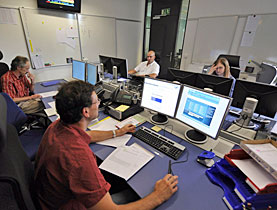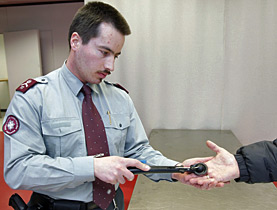Geneva border guards have got the blues

Despite receiving new uniforms and vehicles, Geneva border guards are unhappy, claiming to be overworked, underpaid and misunderstood.
swissinfo went to discover why the force is struggling with burnout and can’t hold onto new recruits and what the possible consequences might be for them as Switzerland stands poised to join the Schengen zone.
It’s rush hour at the Bardonnex border crossing – the busiest post between France and Switzerland – where an estimated 3,600 vehicles cross every hour.
A Swiss guard coolly eyes slowing traffic, smiles and steps forward, motioning to a van to stop so he can ask a few questions.
Yet unbeknown to the driver, the young border guard’s courteous, smiling demeanour hides a deeper malaise.
The Geneva force is seriously understaffed; out of the 316 available fulltime posts, only 242 are filled – the worst level among all Swiss border guards – and the situation has been steadily getting worse over the past two years.
“There should be four of us, but sometimes we are only three or even two,” border guard Ueli Wernli told swissinfo.
The problem is that the labour-intensive work at the busy Bardonnex crossing can quickly stretch resources, he explained.
Wernli and two colleagues recently stopped a coach travelling from northern Europe and discovered 12 forged ID cards and passports belonging to four different people. In all, it took them twelve hours to process the cases.
“In general there is a huge loss of motivation among the guards because of the understaffing problem; we can’t do what we would like to do,” he said.
Tough competition
Owing to stiff competition from the police, gendarmerie and private security companies, and with local border guard candidates struggling to meet entry requirements, it has become increasingly difficult to recruit or hold on to young border guards in Geneva.
Salaries are a major bone of contention. New border guard recruits in Geneva start on a gross monthly wage of SFr3,700 ($3,260), some SFr2,000 less than their colleagues in the cantonal police force. Salaries are also fixed by Bern and are not indexed according to the cost of living, so a Geneva border guard earns the same as a colleague in canton Valais, where each franc goes further.
This year the Geneva force launched several high-profile media campaigns, playing up the exciting “Experts”-style job of a border guard and managed to find 23 new recruits who started training in August.
“But we are still missing 80 people,” said the head of the Geneva border guard, Alain Brenneisen. “My worry is not recruiting people but how to keep them.”
To get a better understanding of the scale of the problem, authorities in Bern carried out a poll among Geneva border guards this summer and says it will present its conclusions by the end of the year.
Survey scepticism
But there is scepticism in the air, especially among the mobile team responsible for controlling Geneva’s southerly, more dangerous entry points.
“Nothing will happen,” complained one border guard. “They’ve done an analysis and taken note to calm things down for another five years.”
2007 was a busy year for the 32-strong team – supposed to be 50 – stopping 700 people wanted by the police, another 100 for drug offences and 900 who had entered Switzerland illegally among other things. Roadblocks were forced on 20 occasions and guns fired twice.
“Some 25 per cent of Switzerland’s border guard activity takes place in Geneva but with only 15 per cent of the staff,” complained Youri Reuse.
“More routes are open and we have less staff, and there is more and more paperwork, a simple case can take one-and-a-half hours,” said Jean-Marc Toffel.
Public misperception
The job of a border guard is changing rapidly to adapt to the 21st century. Guards are generalists but also have to master a wide range of specialist subjects like international police collaboration, drug trafficking or document forgery – an equal source of stress and motivation.
Recent years have seen a shift in responsibilities. Around 80 per cent of the mobile team’s time is now dedicated to police work delegated by the canton and 20 per cent to customs duties.
Although they have spent 30 years trying to make sure their work is better known, the overriding feeling among the Geneva corps is that the general public don’t really understand or respect what they do.
“People have no idea. They still think we spend all our time looking for people who might be trafficking butter or sausages,” said Reuse.
Schengen communication
And this perception is likely to become even more muddied when Switzerland finally becomes a working part of the European Union’s 24-country Schengen zone from December.
The Schengen accord abolishes systematic controls on individuals within its zone of application and increases cooperation in the fight against cross-border crime.
The upshot will be that from December 2008, up to 110 additional border guards will be deployed at Geneva airport to replace international police officers in order to carry out controls on passengers crossing the external Schengen border.
In Geneva the understaffed border guard teams have had to start reorganising their shifts accordingly.
But there is room for potential confusion on the ground. Fewer identity checks within the Schengen zone in theory means fewer ID controls by Swiss border guards, but anyone crossing into Switzerland can still be stopped and searched for illegal goods, weapons or other items.
Brenneisen confirmed that a special public communication programme was planned in December to explain the full implications of Schengen and resulting border guard changes.
“We have to remind the population that free circulation of persons does not mean free circulation of goods,” he explained.
For the stretched border guards, the new workload due to Schengen is still not totally clear, but things could get even busier.
“The message will quickly pass among the small and large criminal community that part of our border guard team has been shifted to the airport. We’ll have even more work than before,” complained one guard.
swissinfo, Simon Bradley in Geneva
The Swiss border guards are the armed service of the federal customs administration, a department of the finance ministry.
There are approximately 2,000 border guards, including 100 women. They work at 91 fixed locations and in 35 mobile units along Switzerland’s 1,881 kilometres of borders.
Their main tasks are fighting illegal immigration, cross-border crime and contraband, but they also deal with counterfeiting and the smuggling of weapons, plants and animals.
Approximately 350,000 vehicles or 490,000 people (of whom 57,000 cross-border workers) cross the border in canton Geneva on a daily basis. Annually about 100,000 people are turned away at the Swiss border and several thousand people who enter Switzerland illegally are intercepted.
Swiss border guards hand over around 30,000 suspects annually to the respective police force. They also uncover some 4,000 cases of cross-border smuggling, 2,000 document forgeries and 30,000 road traffic offences.
The Schengen Area comprises 24 countries, most of which are members of the EU, as well as the four member countries of the European Free Trade Association – Iceland, Norway, Switzerland and Liechtenstein.
Britain and Ireland are not in the zone, but they have signed up to agreements on security.
Switzerland seeks to become a full member of the Schengen Area in December, pending a technical check by international experts.
Swiss voters approved police and asylum cooperation, known as Schengen/Dublin accords, in a nationwide ballot in 2005
A key element of the Schengen agreement is the Schengen Information Service (SIS), which enables police in any Schengen state to find out whether a suspect has been involved in any kind of crime across the EU.
The Schengen treaty takes its name from a town in Luxembourg where it was signed by Germany, France and the Benelux states in 1985.

In compliance with the JTI standards
More: SWI swissinfo.ch certified by the Journalism Trust Initiative














You can find an overview of ongoing debates with our journalists here . Please join us!
If you want to start a conversation about a topic raised in this article or want to report factual errors, email us at english@swissinfo.ch.